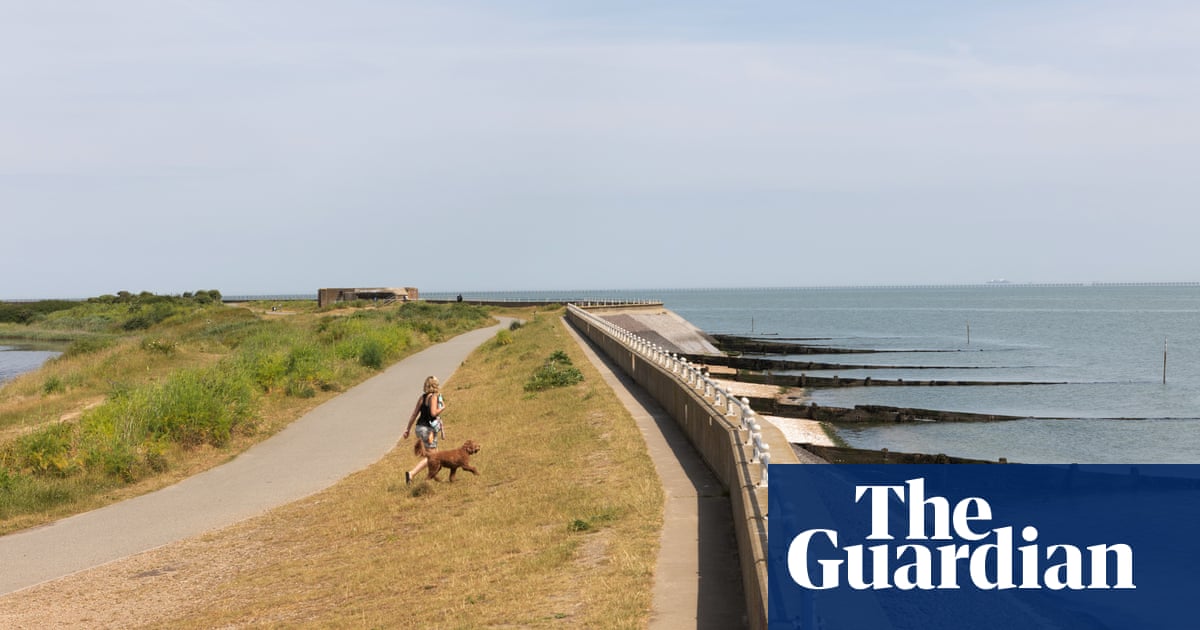
On a small stretch of sand between the train line and the estuary, six people lie face down on yoga mats, wiggling their legs in the air. Their instructor calls the pose “the stranded fish”. The gulls and oystercatchers circling above them seem unconvinced. It’s 10am and the only other people on the beach are families, like us, with very young children – and who’ve been awake for ever. We recognise each others’ hollow eyes and raise our coffee cups in silent communion.
An hour later, two Italian day-trippers from London place their towels on the sand and frown at the view. They were recommended Leigh-on-Sea as a great day at the seaside, and yet there is no actual sea – just mud. It’s low tide and great banks of pungent brown sludge stretch out into the distance, a vision interrupted only by the silos of industry on the far shore. Their eyes speak of a longing for the Mediterranean. Groups of older children happily slither through the pools of thick mud, laughing as their footsteps fart and slurp. It’s a shame that the day-trippers have already packed up and left when the transformation occurs. Over the course of a lunch hour, the little trickling creek cutting through the mud becomes a stream, becomes a river, and soon the mudflats have disappeared entirely beneath the greenish waters, the row of grounded sailboats now lifted and bobbing. That this all happens in perfect synchronicity with the clouds disappearing and the beach filling with people makes it feel like someone flipped a switch marked “summertime”.
Teenagers leap off the wharf and plunge, screaming, into the water. A retired couple – down for the day from Billericay – pull up on their immaculate Harley-Davidson with the brushed copper detailing. They sit on the sea wall and eat trays of chips, each with an eyeball-sized pickled onion. A man intently watches his paddleboard inflate. The cockle shack’s queue keeps growing. Two friends – Alex and Nathan – promenade past the tea rooms with their tops off. All along the harbour front, the restaurants and pubs – The Crooked Billet, The Mayflower, The Peterboat – fill up and spill out on to the cobbles.
On the beach, Valerie De Meo is here with her three daughters, their partners and grandchildren. Since she and her family live in many different places – some in the US, some Norway, some, like her, in Essex – she’s glad of this rare chance to bring them together. We watch her grandkids eating takeaway pizzas in an inflatable dinghy on the sand. She looks at her eldest grandson in his camping chair and tells me that, in his hair and lips, she sees an echo of her husband who passed away 18 years ago. “It’s quite something,” she says, as her grandson looks up from his book, “how they live on in everyone.”
Through the late afternoon, families head home and the atmosphere gets tasty. Four young men briefly park their growling BMWs on the slipway; each drinks a can of Monster. A teenage couple in Dr Martens and cardigans with elbow patches share a sly bottle of strawberry cider. One boy in swimming trunks locks his friend in the public toilets and finds it hilarious. A man drives past very slowly in a souped-up Ford Cortina with a Confederate flag on the dashboard.
Up on the hill above the beach, it’s quiet again. Margaret O’Connor is out in her front garden, zapping the weeds with a heat gun. She’s lived here 30 years but still thinks of herself as one of the “blow-ins” – a new arrival. It’s the fishermen who keep the town grounded, she says. She loves the tides and the seasons, watching the brent geese eat the eel grass on the mudflats. “They come in great flocks in the autumn, great clouds of them from Siberia and, at night, if the wind is right, you can hear them talking to each other.” That’s what she likes about the people in the town, too: everyone says hello. From up here on the hill, we watch the tide on its way out again, a sea becoming a river, a stream, a creek, a trickle – all the day’s footprints erased from the mud.












